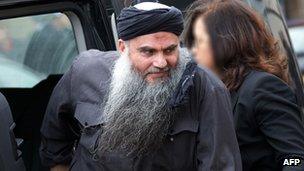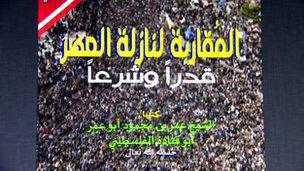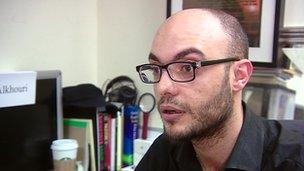Abu Qatada documents 'linked' to Denmark arrest
- Published

Abu Qatada's lawyers are due in court to appeal against the way he was returned to prison earlier this year
Danish police have arrested and charged a man in an investigation linked to radical cleric Abu Qatada in London.
Scotland Yard alerted the Danes as part of its probe into whether the preacher published extremist material online while on bail and fighting deportation.
The arrest was made in Copenhagen after raids on Abu Qatada's London home but police will not release more details.
Abu Qatada's lawyers have been in court to ask that he be released on bail after his arrest in March.
They have said that the cleric would voluntarily return to Jordan if the Jordanian government ratifies a treaty drawn up with the UK government, which includes guarantees on fair trials.
Key role
Although Scotland Yard has not revealed the full nature of its investigation, the BBC has obtained new documents which were recently published in the preacher's name on Islamist websites.
The controversial cleric has spent almost a decade resisting attempts by successive governments to deport him to his native Jordan. He has never been charged with an offence in the UK but is accused of playing a key role in supporting violent jihad.
Following a series of raids in London, including at Abu Qatada's home, police in Copenhagen arrested and charged a man but they will not say who he is or what he is charged with.
Dorit Borgaard, chief prosecutor for the Danish Police, told the BBC "based on information from British police we have conducted several searches and seized material that we are now looking into to assess if it is a case that we wish to take to court. The material is assessed according to the chapter in Danish criminal law that relates to crimes of terrorism."

This document discussing the values of jihad was published in the name of "abu qatada al-filistini"
The online material obtained by the BBC, published in the name of Abu Qatada, was posted online in the last year by a Copenhagen company which has been linked to a known extremist in Denmark who was jailed in 2006 for terrorism offences.
Said Mansour, a Danish citizen from Morocco, was convicted of selling videos and other material calling for a holy war with the West through the publishing house Al Nur Islamic Information.
The company published an article in Arabic from 2012 which refers to events during the Arab Spring. In a long discussion of the role of jihad throughout Arab and Muslim history the author, "abu qatada al-filistini" says "the concern of the jihadists has been, and still is, to spark the flame in the nation and ignite it so that it can achieve its goals. What I know about the jihadists is that they have sacrificed their lives for the sake of the Muslim community and have handed the baton of jihad to others to follow in their path."
Mr Mansour has not returned our calls. His lawyer Peter Hjorne denies his client has been arrested though he confirmed that extremist material has previously been published by Mr Mansour under the guise of Al Nur Islamic Information.
Internet ban
The BBC has also seen postings on well-known jihadist websites which claim to carry messages on behalf of Abu Qatada. In one, published on the pro-al Qaeda site Ansar al-mujahideen, a user states that "in a phone call sheikh abu qatada al-filistini has communicated with his brothers and sisters and sends his greetings".
If the claims are true, this would have been when the cleric was being held at his home on strict bail conditions. In this period he was banned from communicating either directly or indirectly with "any person not physically present" in the UK apart from his family. Though he had access to a landline phone he was also prohibited from using the internet.
In another posting last August, by which time Abu Qatada was back in prison, the same user claimed Abu Qatada had communicated via a call with "two of his students".
In this it is claimed he "gave advice to the people of Jordan on the urgency of supporting the Syrian brothers". This is believed to be a reference to those fighting to overthrow the Assad regime in Syria.
It is not possible to verify whether these postings are authentic or whether any of the articles are the work of Abu Qatada. The cleric's lawyer Gareth Peirce declined to comment.

Laith Alkouri traces the activity of potential terrorist conspirators across the internet
Laith Alkouri who monitors global extremist content online from his office in New York says the material "was posted on a number of top tier al-Qaeda web forums" which operate as "social networking platforms for the jihadist base from all around the world".
He adds that if Abu Qatada is the author, it shows he is able "to communicate his message and to keep his legacy alive, fuelling much of the rage on the jihadi forums".
Scotland Yard is trying to establish if any of the material its officers seized was written by Abu Qatada, and if so, when. Then prosecutors will have to assess if it breaks the law, which is likely to be a finely balanced judgment.
Jordan treaty
Deputy Assistant Commissioner Stuart Osborne, Senior National Co-ordinator Counter Terrorism at Scotland Yard, says the material seized at the cleric's home in March was "in a range of different languages and has probably been transcribed from one language to another in different areas and that is what is actually going to take the time to look through".
If Abu Qatada is charged it is likely the offences would fall under the 2006 Terrorism Act which make it an offence to disseminate terrorist publications and to encourage terrorism.
No-one has been successfully convicted of the latter but at least two people have been found guilty of disseminating terrorist publications.
The material seen by the BBC is mostly of a theological nature, ranging across history and leaning heavily on Islamic jurisprudence. We have seen no clear examples of terrorism law being breached.
While police and CPS decide whether there is a realistic prospect of conviction, the government is continuing its efforts to deport Abu Qatada. Last month it signed a mutual assistance treaty with Jordan providing guarantees on fair trials.
This followed a decision by the Special Immigration and Appeals Court that Abu Qatada could not be deported because of the risk of evidence derived from torture being used against him.
- Published8 May 2013
- Published10 May 2013
- Published24 April 2013
- Published24 April 2013